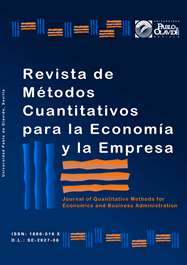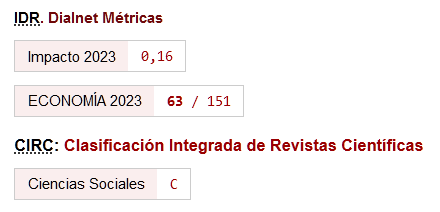Capital Social como factor de emprendimiento en los países de la OCDE: implementación de un modelo con datos de panel
DOI:
https://doi.org/10.46661/revmetodoscuanteconempresa.3512Palabras clave:
emprendimiento, capital social, confianza, empresasResumen
En el presente artículo se analiza el capital social como factor de emprendimiento en los países de la OCDE. Se utilizan las bases de datos del Global Entrepreneurship Monitor (GEM) y la World Values Survey (WVS). De la primera se obtiene la variable de emprendimiento y de la segunda se obtienen variables de capital social, como la confianza y la pertenencia a un grupo del tejido social. Se utiliza un modelo de panel con efectos aleatorios. Los resultados sugieren que las variables de capital social impactan positivamente en la actividad de emprendimiento, incrementando su probabilidad de éxito, no solo en la fase inicial sino también en el largo plazo.
Descargas
Citas
Acs, Z., Audretsch D., & Lehmann E. (2013). The Knowledge Spillover Theory of Entrepreneurship. Small Business Economics, 41(4), 757-774.
Audretsch, D., & Keilbach M. (2005). Entrepreneurship Capital and Regional Growth. The Annals of Regional Science, 39(3), 457-469.
Barrutia, J.M., & Echebarria C. (2010). Social Capital, Research and Development, and Innovation: An Empirical Analysis of Spanish and Italian Regions. European Urban and Regional Studies, 17(4), 371-385.
Bawuah, B., Sare Y., & Musah A. (2014). The effect of Interest Rate on Micro, Small and Medium Enterprises Financing Decision in Wa Municipality of Ghana. International Journal of Business, Humanities and Technology, 4(4), 81-90.
Bizri, R. (2017). Refugee-Entrepreneurship: a Social Capital Perspective. Entrepreneurship and Regional Development, 29, 847-868.
Breusch, T.S., & Pagan A.R. (1980). The Lagrange multiplier test and its applications to model specification in econometrics. Review of Economic Studies, 47, 239-253.
Castellano, H. (2005). La planificación del desarrollo sostenible: Contenidos, entorno y método. Caracas: Cendes.
Castillo, R., & Smida, A. (2009). El rol del capital social del emprendedor en la expansión exitosa de una Start-up. El caso de hipertexto LTDA. La librería de la U. Estudios Gerenciales, 25(113), 15-36.
Castillo-Vergara, M., Álvarez-Marín A., Alfaro-Castillo M., Sánchez, J., & Pizarro I. (2018). Factores Clave en el Desarrollo de la Capacidad Emprendedora de Estudiantes Universitarios. Revista de Métodos Cuantitativos para la Economía y la Empresa, 25, 111-129.
Coleman, J.S. (1988). Social capital in the creation of human capital. American Journal of Sociology, 94, 95-120. DOI: 10.1086/228943.
Evans, D., & Jovanovic, B. (2018). An Estimated Model of Entrepreneurial Choice Under Liquidity Constraints. Journal of Political Economy, 97(4), 808-827.
Fukuyama, F. (1995). Trust: The Social Virtues and the Creation of Prosperity. New York: Free Press.
Galindo, M., & Méndez T. (2012). Innovación y crecimiento económico: Factores que Estimulan la innovación, Cuadernos de Gestión, 12, 51-58.
Gawel, A. (2010). The Relationship between Entrepreneurship and Unemployment in the Business Cycle. Journal of international Study, 4(1), 59-69. DOI: 10.14254/2071-8330.2010/3-1/7.
Gedajlovic, E., Honig B., Moore, C., Payne, G., & Wright, M. (2013). Social Capital and Entrepreneurship: a Schema and Research Agenda. Entrepreneurship Theory and Practice, 37(3), 455-478.
Geroski, P.A., & Murfin, A. (1991). Entry and Intra-Industry Mobility in the UK Car Market. Oxford Bulleting of Economics and Statistics, 53(4), 341-359.
Hausman, J.A. (1978). Specification tests in econometrics. Econometrica, 46(6), 1251-1271.
Hornungová, J. (2014). Factor Analysis: An Instrument for Selection of Performance Factors. Revista Métodos Cuantitativos para la Economía y la Empresa, 17, 121-136.
Huggins, R., & Thompson P. (2015). Entrepreneurship, Innovation and Regional Growth: a Network Theory. Small Business Economics, 45(1), 103-128.
Johanninson, B. (1996). The Dynamic of Entrepreneurial Networks. En P.S. Reynolds (ed.), Frontiers of Entrepreneurship (pp. 253-267), Babson College.
Kantis, H. (2004). Un enfoque sistémico de la creación de empresas. En H. Kantis, P. Angelelli, V. Moori Koenig (Eds.), Desarrollo Emprendedor: América Latina y la experiencia Internacional, (pp. 21-34). Banco Interamericano de Desarrollo. Fundes Internacional.
Knack, S., & Keefer, P. (1997). Does Social Capital Have an Economic Payoff? A Cross-Country Investigation. Quarterly Journal of Economics, 112(4), 1251-1288. DOI: 10.1162/003355300555475.
Kuznets, S. (1971). Economic growth of nations, total output and production structure. Massachusetts: Harvard University Press.
Lamine, W. (2017). The Social Network and Entrepreneurial Process: A Sociotechnical Approach. Thunderbird International Business Review, 59(5), 623-633.
Macauley, S. (1963). Non-Contractual relationship in business: A preliminary study. American Sociological Review, 28(1), 55-70.
Neira, I., Portela, M., Cancelo, M., & Calvo, N. (2013). Social and human capital as determining factors of entrepreneurship in the Spanish Region. Investigaciones Regionales, 26, 115-139.
North, D. (1981). Structure and Change in Economic History. New York: Norton.
Portela M., & Neira I. (2002). Capital social: concepto y estudio econométrico sobre capital social en España. Estudios Económicos de Desarrollo internacional, 2(2), 25-52.
Putnam, R. (1995). Bowling alone: American´s declining social capital. Journal of Democracy, 6(1), 65-78. DOI: 10.1353/jod.1995.0002.
Raiser, M., Rousso, A., Steves F., & Teksoz, U. (2007). Trust in Transition: Cross-country and firm evidence. The Journal of Law, Economics, and Organization, 24(2), 407-433. DOI: 10.1093/jleo/ewm060.
Ramos, A.R., Medina, J.A., Lorenzo, J.D., & Ruiz, J. (2010). What you know or who you know? The role of intellectual and social capital in opportunity recognition. International Small Business Journal, 18(6), 566-582.
Rees, H., & Shah, A. (1986). An Empirical Analysis of Self-Employment in the U.K. Journal of Applied Econometrics, 1(1), 95-108.
Rodríguez, C., Maté, M., & López, F. (2017). El Contagio en el Fracaso Empresarial como Consecuencia de la Proximidad Geográfica: un Análisis con los Estadísticos Join-Count Aplicado al Sector Servicios. Revista Métodos Cuantitativos para la Economía y la Empresa, 23, 75-97.
Schultz, D.E. (1991). Integrated marketing communications: the status of integrated marketing communications programs in the US today. Journal of Promoting Management, 1(1), 98-104.
Shapero, A. (1984). The Entrepreneurial Event. En C. A. Kent (Ed), The environment for Entrepreneurship, (pp. 21-40). Toronto, Canada: Lexington Books.
Solow, R. (2000). Notes on social capital and economic performance. En, Dasgupta P., & Sarageldin, Social capital: A multifaceted perspective, World Bank, pp. 6-10.
Stiglitz, J. (1999). Wither Reform? Ten Years of Transition. Keynote Adress, World Bank, Annual Conference on Development Economics, pp. 32.
Strandholm, K., Marino, L., Steensma, H.K., & Weaver, K.M. (2002). Harnessing Complexity: The Moderating Effect of National Culture on the Relationship Between Entrepreneurial Orientation and Strategic Alliance Portfolio Complexity. Journal of Entrepreneurship: Theory and Practice, 26, 145-161.
Williams, N., Huggins, R. & Thompson, P. (2018). Entrepreneurship and Social Capital: Examining the Association in Deprived Urban Neighborhoods, International Journal of Urban and Regional Research, 44(2), 289-309. DOI: 10.1111/1468-2427.12589.
Woodruff, C. (2004). Establishing confidence in business partners: courts, networks and relationship and pillars of support. En J. Kornai, B. Rothstein, S. Rose-Ackerman (eds.), Creating Social Trust in Post-Socialist Transition (111-125). New York: Palgrave Macmillan. DOI: 10.1057/9781403980663_7.
Publicado
Cómo citar
Número
Sección
Licencia
Derechos de autor 2020 Revista de Métodos Cuantitativos para la Economía y la Empresa

Esta obra está bajo una licencia internacional Creative Commons Atribución-CompartirIgual 4.0.
El envío de un manuscrito a la Revista supone que el trabajo no ha sido publicado anteriormente (excepto en la forma de un abstract o como parte de una tesis), que no está bajo consideración para su publicación en ninguna otra revista o editorial y que, en caso de aceptación, los autores están conforme con la transferencia automática del copyright a la Revista para su publicación y difusión. Los autores retendrán los derechos de autor para usar y compartir su artículo con un uso personal, institucional o con fines docentes; igualmente retiene los derechos de patente, de marca registrada (en caso de que sean aplicables) o derechos morales de autor (incluyendo los datos de investigación).
Los artículos publicados en la Revista están sujetos a la licencia Creative Commons CC-BY-SA de tipo Reconocimiento-CompartirIgual. Se permite el uso comercial de la obra, reconociendo su autoría, y de las posibles obras derivadas, la distribución de las cuales se debe hacer con una licencia igual a la que regula la obra original.
Hasta el volumen 21 se ha estado empleando la versión de licencia CC-BY-SA 3.0 ES y se ha comenzado a usar la versión CC-BY-SA 4.0 desde el volumen 22.











